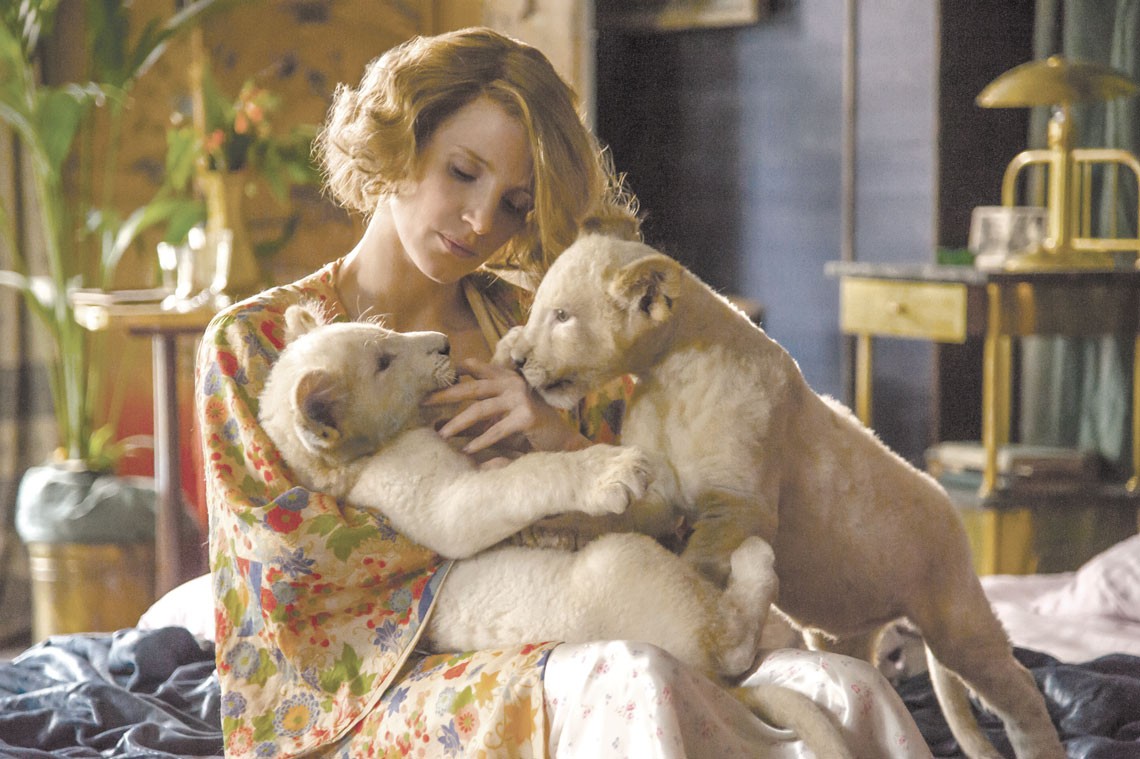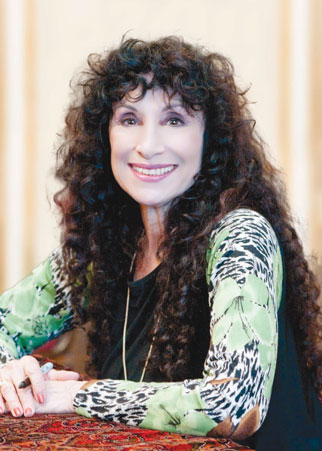 Jessica Chastain stars in “The Zookeeper’s Wife.” Photo by Anne Marie Fox/Focus Features
Jessica Chastain stars in “The Zookeeper’s Wife.” Photo by Anne Marie Fox/Focus Features 
Actress Jessica Chastain may be best known for her Oscar-nominated turns in the racial drama “The Help” and the action-spy thriller “Zero Dark Thirty,” but her roles that have touched upon the Holocaust are among those that have moved her the most.
In 2010, Chastain starred as a Mossad agent and Auschwitz survivor in “The Debt,” a character “who absolutely broke my heart,” she said during a recent telephone interview from New York. And in her new film, “The Zookeeper’s Wife,” she portrays a Holocaust rescuer who hid some 300 Jews at the Warsaw Zoo during World War II. The 40-year-old actress is also an executive producer of the movie.
Chastain said she first became aware of Nazi atrocities while presenting a book report, at the age of 12, on Anne Frank’s “The Diary of a Young Girl.” She appeared before her class wearing a costume that included a Star of David she had sewn. “I hadn’t previously understood that a person could be discriminated against based on their religion,” she said. “And to hear it from the perspective of a girl my age was very powerful.”
Chastain drew on some of those emotions to portray the fictional Rachel Singer in “The Debt,” based on the 2007 Israeli film “Ha’Hov,” in which her character endeavors to kidnap and bring to justice a former Nazi physician known as “The Butcher of Birkenau.”
Chastain’s research for the film proved devastating, she said: “I hadn’t known about the medical experiments in the camps,” she told the Journal in 2010. “I read an awful story about a woman who had given birth to her baby, and they wanted to see how long the child would survive without being touched or fed. So, this woman had to be there, listening to her child cry and starve to death. It was an element of cruelty unlike anything I had ever known.
“Another thing that really shocked me was that I just felt this rage: When they started to separate the Jews from everybody else, why didn’t people stand up and say, ‘This isn’t right?’ I would get into these debates with my friends, and they’d say, ‘A lot of people had kids, and they knew that if they spoke out they would be killed along with their entire families.’ … I was going through a lot of emotional turmoil and then questioning myself: If something like that happened right now, would I be brave enough to step forward?”
Chastain plays a character who does just that in “The Zookeeper’s Wife,” based on Diane Ackerman’s 2007 nonfiction book of the same name. The film’s heroine, Antonina Zabinska, along with her husband, Jan Zabinski, hide as many as 300 Jews in between the halls of their zoo and villa, as well as in animal cages and underground tunnels in the facility. (In Polish, “ska” is the feminine form of the surname ending of “ski.”)
The couple risk their lives — and that of their young son — even as leading Nazi zoologist Lutz Heck conducts animal experiments at the zoo to resurrect an ancient German breed of bull. All the while, Antonina empathetically cares for their Jewish “guests” as Jan clandestinely works for the Polish underground, spiriting away Jews from the Warsaw ghetto.
“Many times we celebrate heroes who use violence and aggression,” Chastain said in the recent interview. “I was drawn to Antonina because her weapon, or tool of choice, was compassion and love.”
In the film, animals are often treated like humans — at least by the Zabinskis — and humans like animals, Chastain noted. In one scene, a man and woman stand just outside the Warsaw ghetto and snap a photo of the Jews inside, “as if they are at the zoo,” she said.
Ackerman, an acclaimed author and naturalist who sold the film rights to “The Zookeeper’s Wife” eight years ago, knew Chastain was right for the part when she heard the actress had visited Auschwitz as part of her research for the movie.
“She went because she wanted to know what was at stake for Antonina,” Ackerman recalled in an interview from her home in Ithaca, N.Y. “She brought that complete immersion in the story to her role.”
Ackerman, 68, has harbored a love for animals and nature since she was a young girl in Waukegan, Ill. She discovered Antonina’s story while researching an endangered ancient breed of Polish horses for a prospective article in National Geographic around 2000.
“I felt like I needed to see the horses, and also to find out more about my Jewish heritage in Poland,” said Ackerman, whose grandfather fled that country before the Holocaust.
While trying to arrange a trip, Ackerman learned that her Polish neighbor had an uncle who had been a veterinarian at the Warsaw Zoo during the war. He told her that the zookeeper’s wife had kept journals of her experiences. Upon Ackerman’s request, he was able to procure those writings from stacks of old books at the zoo. Ackerman asked the man’s niece to translate the journals and was riveted by Antonina’s story, which she likened to that of Holocaust rescuer Oskar Schindler, who was feted in Steven Spielberg’s Academy Award-winning film, “Schindler’s List.”
“But Antonina’s story had fallen through the cracks of history,” Ackerman said, “which is why I wanted to tell it.”
Ackerman also was drawn by the fact that Antonina “had not only taken in orphaned animals, but orphaned people as well.”
The author theorized that the Russian-born Antonina may have become more attuned to human behavior because her parents were murdered during the Russian Revolution of 1917.
“Children who lose their parents can become hyper-sensitized, because they need to know whether they will be protected if they are in danger,” Ackerman said. “So they learn how to read people very well.”
“Antonina could calm animals, and she also knew she could apply that to human animals,” Ackerman said of her heroine’s approach to Nazi predators.
Would Chastain have been willing to risk her life to save others, like her character?
“To quickly say, ‘Oh yes, I could do that,’ undermines and devalues the actual sacrifices that Antonina made,” she said. “I absolutely hope and dream that we’re never in a situation where that’s going to be tested. But if ever we are, and I can stand up for people the way that she did, that would be wonderful.”
“The Zookeeper’s Wife” will open in theaters on March 31.






















 More news and opinions than at a Shabbat dinner, right in your inbox.
More news and opinions than at a Shabbat dinner, right in your inbox.